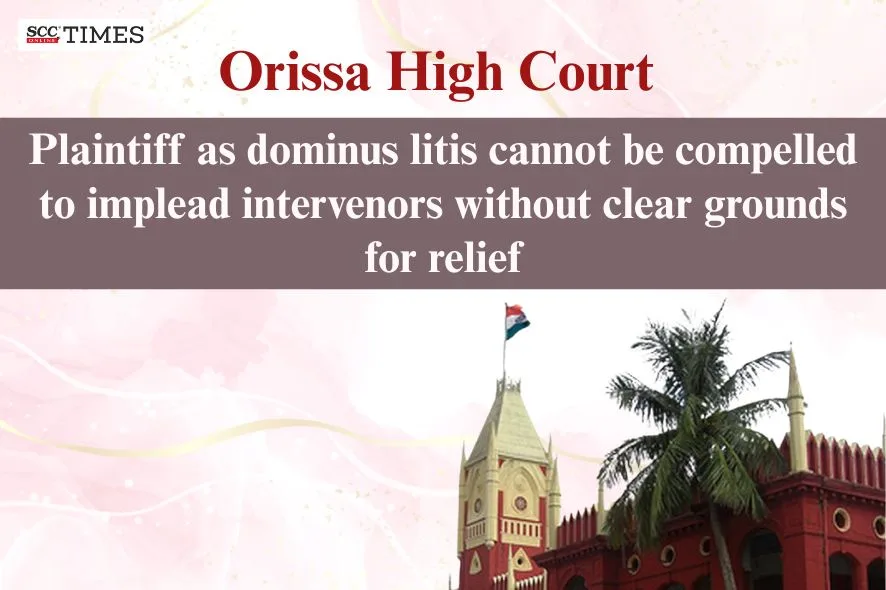Orissa High Court: In a petition filed by the petitioner, she challenged the Trial Court’s order that allowed third-party interveners to be impleaded as defendants in her civil suit, which sought injunction and compensation over land she claimed to have lawfully purchased and possessed. A Single Judge Bench of Justice Sashikanta Mishra, J., while allowing the petition, observed that the stand taken by the original defendants in their written statement was identical to the plea of the third-party interveners in their application for impletion. The Court emphasised that it was neither shown nor demonstrated that the suit, as framed, could not be effectively adjudicated in their absence.
Background:
The case arose from a civil suit filed by the Petitioner, as Plaintiff, seeking a decree of permanent injunction restraining the defendants from entering the suit land, compensation of Rs 30,000, cost of the suit, and any other reliefs in law and equity. She claimed to have purchased the suit property from the recorded owner and entered possession. The land, originally agricultural, was converted to Gharabari (Homestead). It was subsequently mutated in her favour and the ROR (‘Record of Rights’) was published.
However, her possession was allegedly disturbed by the proforma defendants, who uprooted boundary cement pillars on 25-08-2021. Again, on 01-09-2021, when she and her husband attempted to construct a boundary wall, they were obstructed. She approached the Police Station, but no action was taken as the dispute was civil in nature.
The proforma defendants (Opposite Parties 6 to 9) filed a joint written statement asserting that the suit land was of jungle kisam and communal in nature, used as a public road, playground, grazing field, etc., and therefore could not be recorded in any private individual’s name.
Subsequently, Opposite Parties 1 to 5, acting as third-party interveners, filed an application under Order I Rule 10 of the CPC, seeking to be impleaded as defendants. They echoed the assertion that the land was of jungle kisam and communal in nature, claiming that the villagers had a shared interest in the property. In response, the plaintiff raised objections to their impleadment.
The Trial Court allowed the application and impleaded the third-party interveners as defendants. However, the plaintiff argued that she, being dominus litis, could not be compelled to implead parties against whom she did not seek relief, and that the Trial Court gave no valid reason beyond avoiding future litigation.
Analysis and Decision:
The Court emphasised that it is ordinarily permissible to implead parties if it feels that the said party’s presence would be necessary to enable the Court to effectually and completely adjudicate upon and settle the questions involved in the suit. The Court noted that this is the test to be applied to the facts of the present case.
The Court observed that it was claimed the suit land was communal in nature, although the plaintiff asserted that she had validly purchased it from the recorded owner and had converted its nature and mutated it in her name.
The Court further highlighted that there was no difference between the stand taken by the original defendants in their written statement and the plea of the third-party interveners in their application for impletion. Therefore, the Court held that the argument regarding the land’s communal nature and the villagers’ interest in it was unacceptable, as the original defendants already raised the same contention.
The Court noted that the third-party interveners did not present any additional plea to demonstrate how their impletion was necessary for the effectual and proper adjudication of the case. Accordingly, the Court held that it was not shown or established that the suit, as framed, could not be effectively adjudicated in their absence.
The Court observed that the Trial Court did not cite any valid reason justifying the impletion of the third-party interveners. It was merely stated that their inclusion would avoid multiplicity of suits, without explaining how.
The Court reiterated that the plaintiff, being dominus litis, could not be compelled to implead someone against whom no specific relief was sought. Therefore, the Court held that if she chose not to include them, she did so at her own risk.
The Court found that the impugned order lacked legal justification and warranted interference. Accordingly, the petition was allowed, the Trial Court’s order was set aside, and the application filed by Opposite Parties 1 to 5 under Order I Rule 10 of the CPC was dismissed.
[Sabita Sahu v. Nishakar Singh, 2025 SCC OnLine Ori 3903, decided on 31-10-2025]
Advocates who appeared in this case:
For the Petitioner: Anupam Dash, Advocate
For the Opposite Parties: P. K. Satapathy, Advocate


